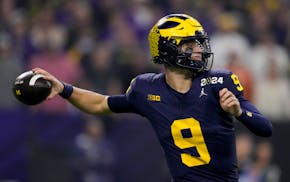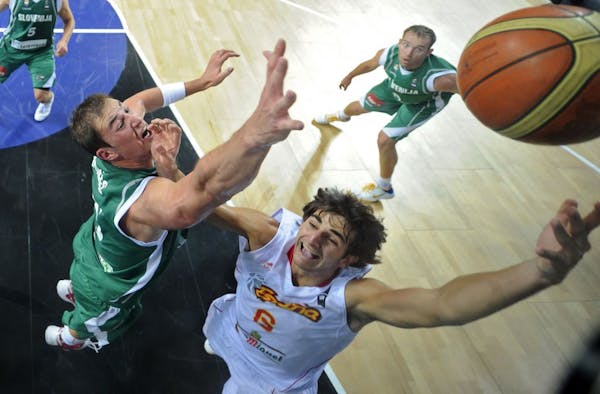As the NBA Finals begin tonight, consider two basketball stars.
One is on the verge of proving much of the sports world wrong; one has simultaneously become less popular than property tax.
Player A is everything you would want in a competitor.
Despite his superior talent, he plays unselfishly, deftly setting up teammates. Rather than relying on his immense offensive skills, he has made himself one of the best defenders in the league, a player who frequently and singlehandedly chases down and ruins fast breaks.
Player A has proved during these playoffs that he can be a dominant clutch shooter, erasing one of the few doubts his critics could express about his all-around game.
In a sport where players are judged by championships won, Player A removed himself from a comfortable setting and took less money than he could have made elsewhere, choosing to chase titles rather than maximum dollars. He also subjugated his ego by choosing to play with other stars.
Player A held a television special to promote charity and never has been forced to wear one of the sports world's scarlet letters, for alcohol abuse, poor treatment of women, drug abuse or violence. His presence with his new team has elevated the popularity of an entire league.
And in his most recent triumph, Player A made all of the big shots for his team on offense while shutting down his opponent's star player.
By these measures, it is a wonder that Player A is not the most celebrated athlete in existence.
Player B, meanwhile, has executed the worst public-
relations campaign since the CEOs of GM, Chrysler and Ford flew a private jet to Washington, D.C., to ask for a $25 billion bailout.
Player B created a television special to dismiss the team that drafted, developed and paid him grotesque sums, and the state in which he was raised. Worse, Player B chose to spend time with Jim Gray.
Player B reflexively refers to "my talents" and denigrates the talents of former teammates who helped him reach the NBA Finals. Player B, given a platform upon which he could build a pristine reputation, constantly utters
statements that make him sound vain, insulated, self-absorbed and whiny.
Player B is, of course, LeBron
James.
So is Player A.
Tonight, James and the Miami Heat will face Dallas in Game 1 of the Finals. It is an intriguing series pitting James and his new BFFs Dwyane Wade and Chris Bosh against Dirk Nowitzki and the Mavericks' team of savvy veterans, and this series will culminate a season made more fascinating by James' dynamic play and tone-deaf commentary.
The series will become the latest but not the last referendum on James. Does he deserve to be compared to the greatest players of all time? Was he was justified in leaving Cleveland, another team with which he visited the Finals, for Miami?
Modern sport is dominated by story lines and instant reaction, making every arrogant utterance by James a story unto itself.
That's a shame, because James' persona distracts us from the brilliance of his performances.
When center fielder Jim Edmonds was stuck in Class AAA in the Angels organization, then-GM Bill Bavasi kept receiving negative reports from his scouts on Edmonds' attitude and body language. Edmonds' statistics contradicted the eyewitness assessments.
Finally, Bavasi told his scouts to keep their eyes off Edmonds unless he was in the batter's box or sprinting after a flyball. No longer nagged by Edmonds' arrogant slouch, scouts started giving him more credit for his productive at-bats and spectacular catches, and Edmonds became a star.
If you want to hate James, read a list of his most annoying quotes before every game, and tune into his postgame news conferences, where he will sound like a medieval king grousing about peasants.
If you want to see an immensely talented athlete blossoming into one of the greatest players of all time, watch James only when the ball is in play.
He is 6-9 and 250 pounds of pure muscle. He is one of the fastest and strongest players in the league. He is one of the quickest and most dynamic leapers in the game. He can post up or guard smaller players, beat bigger players off the dribble and sink three-pointers with ease.
He is an unselfish and deft passer, and during these playoffs he has looked increasingly comfortable taking and making big shots.
You can love LeBron James, or you can hate him, depending on whether you value actions, or words.
Jim Souhan can be heard Sundays
from 10 a.m.-noon on AM-1500 KSTP.
jsouhan@startribune.com

Souhan: These seven plays showcase Wolves' new defensive fire

Souhan: Wolves fans made Game 1 special. Now bring on Game 2.

Souhan: Should Vikings even consider McCarthy in NFL draft?

Souhan: NAW erases Suns' lead, Game 1 advantage with big performance


